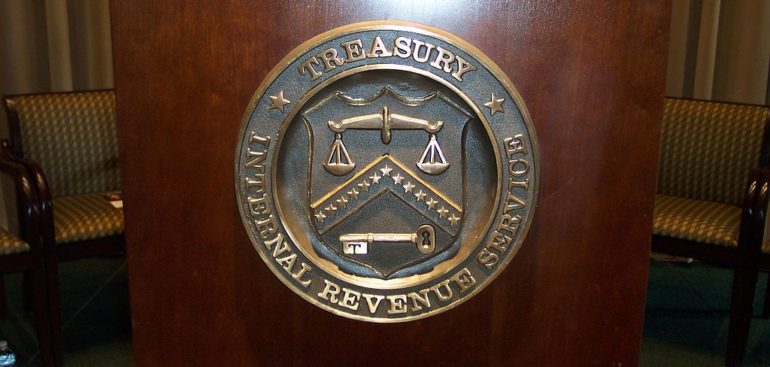What can the IRS do if you owe them money?
According to the IRS, their job is to find ways to recuperate their money. In doing so, they may seize (levy) your assets, such as retirement income, social security benefits, bank accounts, and wages. They may even seize your real estate, boat, car, and any other property you may have and sell it to satisfy the debt.
The first way to collect their money comes from garnishments. For example, if you are self-employed and 1099’d, they can take 100% out of your paycheck. W-2’d individuals, on the other hand, are in a slightly better position, especially those married with kids. The IRS can take most, but not all, depending on their filing status.
Aside from that, the IRS can garnish income through a business’ merchant account, such as PayPal, Stripe, and Square. In this case, they can take it all (100%). As for self-employed with personal tax debt, the IRS will send a garnishment letter to the business to garnish the owner’s wages. So, although they cannot take money from the business, they have figured out a way to get their owed money back since almost nobody chooses to garnish themselves.
That aside, if you have any state income tax refunds or future federal tax refunds, the IRS may seize them and then apply them to your federal tax liability.
Can the IRS put you in jail?
Generally, no. There is no such thing as a debtor’s prison, although an unfiled tax return is punishable by 12 months in jail, at least on paper. The IRS chooses not to pursue criminal tax evasion cases for many individuals annually. However, those that are caught are called to pay harsh penalties. These cases have to do with criminal intent, such as blatant tax evasion, and start with an audit of the filed tax return.
If the IRS identifies a pattern of willful evasion (i.e., large error sums occurring for several years), they have a strong indication that the taxpayer has willingly and knowingly committed serious tax evasion. This, consequently brings them under criminal investigation. The same applies to unreported income (i.e., from a side hustle) and dodgy behavior during an audit (i.e., purposely hide bank accounts or other records).
So, even though the IRS itself cannot put you behind bars, the court can if the IRS initiates a criminal investigation and you are found guilty. Although this is rarely the case (very few taxpayers face criminal charges for tax fraud annually), it still is a possible scenario.
Can the IRS levy your bank account?
Yes. An IRS levy gives the service the right to seize your property to satisfy a tax debt. Besides garnishing your wage and seizing your personal property, they can also take money from a financial account, such as a bank account. To do this, they first freeze the account for 21 days. Whatever money you have in that account is turned over to the IRS at the end of the 21-day period. This is an automated process done by the bank. Note that the IRS can levy any bank account in which your name appears, whether you are the sole owner or co-owner.
This is a serious situation that can put the taxpayer in a very tough spot. Nevertheless, Innovative Tax Relief knows how to fix it if you act fast. Although it is a difficult task, there is a good chance that you can get the account funds unfrozen and the levy lifted if we have enough time in the 21-day window. Our expertise can help achieve this outcome and make the IRS change course.
Can the IRS place a lien on your property?
Yes. The IRS can place a lien on your property, which means that you will have to pay the due amount when you sell it. It should be noted that the IRA cannot force a foreclosure on your primary home. But they can take your second home or an investment property and force a sale. Generally speaking, they do it when the tax debt is over $25k.
This is because a lien is a legal claim against your property to satisfy a tax debt as opposed to a levy which is a legal seizure of your property for the same reasons. In other words, a levy allows the IRS to take your property while a lien does not.
If you get a lien, though, all creditors are alert that the government has a legal right to your property as the IRS files the Notice of Federal Tax Lien, a public document that informs creditors that there is a secure claim against your assets. This can affect your credit report as credit reporting agencies can find the Notice and include it in your credit report. A levy is nothing like that as it is not a public record.
Can the IRS seize your business property?
In short, yes. The IRS can seize your business property to get paid the amount you owe them. They cannot seize business assets tied to no net recovery for the IRS. This means that they can get their hands only on business property that has equity. In doing so, they start the collection process by sending you a Notice and Demand for Payment letter.
At this time, you may be offered installment payment plans to repay your due taxes, depending on your financial circumstances. Or, you could file an Offer in Compromise, which will allow the IRS to consider the tax bill as fully repaid by making a partial tax payment. If you refuse to pay your taxes or don’t respond to the letter, the IRS sends a Notice of Federal Tax Lien, which enables them to claim your business property (both present and future).
The Notice of Levy is the final step before your business property is seized for back taxes. Usually, you have 30 days before they actually seize your business assets. During this time, you can make some efforts to stop the levy (i.e., set up an installment payment plan, discuss your case with an IRS manager, etc.).
If you reach no resolution within the 30-day window, the IRS will seize your business property, including rental income and accounts receivables, and force a sheriff’s sale of the business property and business items.
Also, if you operate as a sole proprietorship (have personal liability for the owed business taxes), the IRS may even garnish your Social Security benefits, retirement payments, and wages to pay the tax bill.
Innovative Tax Relief can help you stop the seizure by trying to appeal the levy., which is a time-consuming process and often overwhelming for business owners.
Can the IRS repo your vehicle?
The IRS has the legal right to take your vehicle’s title, right, and interest. This means that they can seize a vehicle you own. However, this is an option that is left as a last resort. The IRS will only consider seizing your car or another vehicle if there is equity in it.
For instance, if you have purchased a $15,000 car and are making payments on it and still owe $12,000, it will be highly unlikely for the IRS to take it. If you have paid off a $25,000 vehicle, though, they will seize it. This is because there should be equity so the IRS can keep it (the equity) after they auction off the vehicle and repay the lien holder. If there is no equity, they are not interested in seizing your car.
In general, the IRS will not pursue repossessing your vehicle unless there is around 20% equity they can get from the sale of your vehicle. And, this is after they take out 20% of your asset of the fair market price. So, a $30,000 vehicle they seize is actually worth $24,000.
Aside from that, the Congress passed the Taxpayer Bill of Rights in 1988, which gives taxpayers more rights concerning what the IRS can seize. The same bill also limits the IRS’ actions in regards to the process in which they can seize it. In other words, the IRS won’t just show up one day at your business or home and seize your vehicle. They are obliged to give you a 30-day notice of the intent. Plus, you have the legal right to be represented by a CPA or attorney and appeal an IRS decision.
All in all, the IRS does not favor repossessions of taxpayers’ assets, like their vehicle. They will, instead, want to work out any issues related to back taxes as they usually understand that seizing your vehicle can severely affect your day-to-day life. There is also a code that does not allow the IRS to put an additional economic burden on you (or cause one).
However, the IRS CAN seize and sell your second and third vehicles. If you find yourself in such a situation, please contact Innovative Tax Relief to assist you in keeping your vehicle and settling with the IRS.




